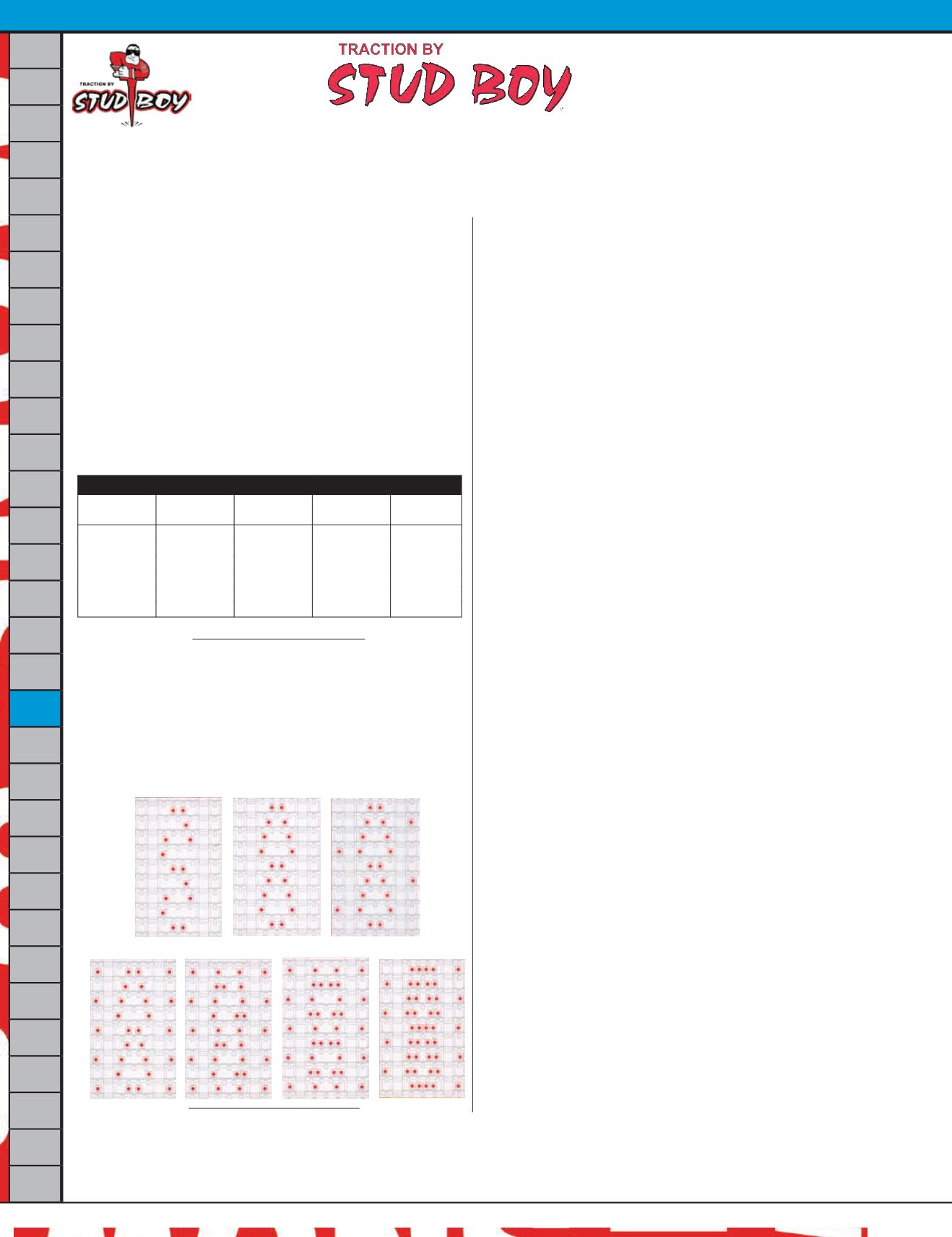

x
X X
X
X
972
HELMETS
HELMET
ACCESSORIES
EYEWEAR
APPAREL
PROTECTIVE
SURVIVAL /
BAGS
VIDEOS
SNOWMOBILE
ACCESSORIES
SNOWBIKE
SLEDS /
TRAILERS
ELECTRICAL
EXHAUST
ENGINE
STEERING /
CONTROLS
AIR /FUEL
WINDSHIELDS
BODY
TUNNEL /RAIL
ACCESSORIES
TRACKS /STUDS /
SPROCKETS
REAR
SUSPENSION
SHOCKS
FRONT
SUSPENSION
SKIS /RUNNERS
BRAKES
CHAIN /
SPROCKETS
BELTS
CLUTCHING
CHEMICALS
TOOLS /
FASTENERS
PROMOTIONAL
REFERENCE
INDEX
T-NUT STUDS
Start with Steps 1 and 2 above.
3. Push a T-nut puller through hole from the outside of the
track.
4. Thread a T-nut onto the T-nut puller and seat into the track.
5. Reverse your installation tool and remove T-nut puller from
the T-nut while maintaining pressure on T-nut to keep it in the
track.
6. Position backer plate onto stud. Put a drop of thread locker
on the T-nut threads and stud threads. Be sure to align your
backer plate with track lug.
7. Torque stud to 80 to 100 inch-lbs. and let thread locker dry
for 24 hours at room temperature.
TRACTION AND CONTROL GUIDE
STUD INSTALLATION
To ensure minimal stud loss, check for studs that have
loosened after each outing.
1. Use Stud Boy’s studding template, paint marker and
instructions and transfer the pattern of your choice on the
track.
2. With a sharp Stud Boy track hole cutter, drill the pattern
you marked on the track during step 1. Be sure to hold your
cutter straight and watch while drilling to avoid damage to the
idler wheels or other suspension components.
72 Studs
96 Studs
120 Studs
144 Studs
168 Studs
192 Studs
240 Studs
STUD QUANTITIES
Illustrations below are for reference only. May not apply to the
make and model of your snowmobile.
How many studs you should install:
A good starting point is 1-1/2 studs per horsepower. When
using this formula as a starting point, you can increase
or decrease the number of studs to fit a pattern that best
suits your riding style. We strongly suggest that you use not
less than one stud per horsepower at any time. However,
be careful not to over-stud. Over-studding will allow less
penetration, resulting in a loss of traction. Also, if you over-
stud you may lose the ability to turn.
PUSH-THROUGH STUDS
Start with Steps 1 and 2 above.
3. Position the stud into the hole in your track from the inside
of the track.
4. Install the backer plate and lock nut onto the installed stud
(Do not use Loctite™ when using nylon lock nuts).
5. Tighten the stud assembly using a deep well socket and
allen wrench until the stud and backer plate bottom out
against each other. Don’t over tighten the lock nut. Be sure to
align your backer plate with track lug.
STUD LENGTH
Trail riders should use a stud that is no more than 3/8” (.375”)
taller than the tallest part of your track. While some people
use longer studs in trail and racing applications, you must
take special precautions to ensure that you will not damage
your sled or the traction products. Be sure to check your
installation for proper protection of the tunnel, tunnel
protectors and heat exchangers.
FORMULA: T-nut Studs
- Stud length + Backer plate (steel
.190” or alum. .225”) + Track deflection (.045”) - Track lug
height = Effective stud length. Example: .875” + .225” +.45” -
.725” = .420” effective stud length.
Push-through Studs
- Stud length + Backer plate (.190”)
+ Track deflection (.045”) - Track lug height = Effective stud
length. Example: .75” + .19” + .045” + .725” = .385” effective
stud length.
Recommended Stud Quantities
Snowmobile
Horsepower
Traction for Trail
riding
Agg. trail, snow-
cross or X-country
Drag racing Ice
or Grass
Oval Racing
0-60
72
72-96
96
96-120
60-75
72
96*
120
144
75-100
96
120
144
168
100-120
120
144
168-192
192
120-140
144
168-192
192
240
130-170
192
240
240
336
*Note
: Snow-cross rules dictate 96 studs in the center of the track.
RECOMMENDED STUD
PATTERNS
TRACKS / STUDS / SPROCKETS


















